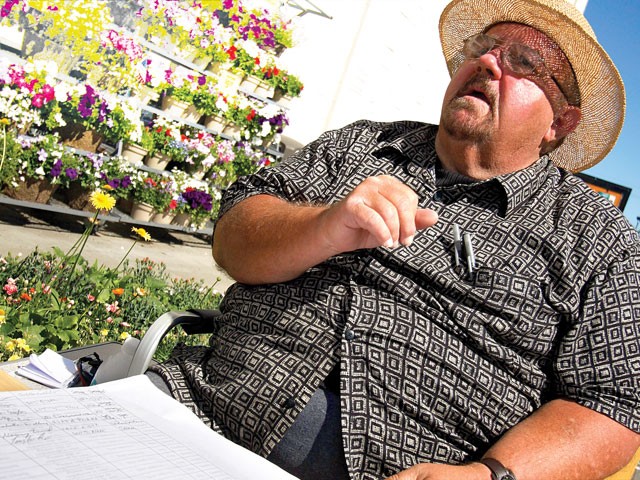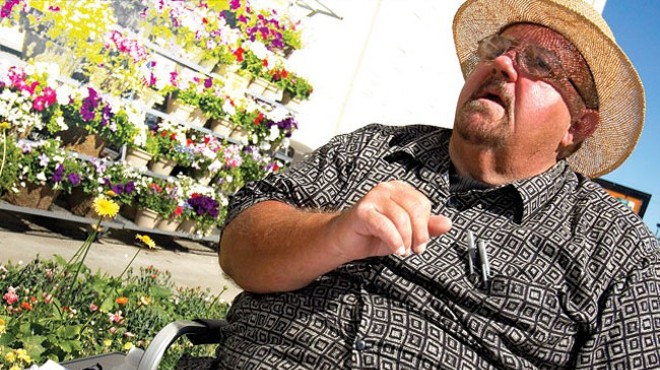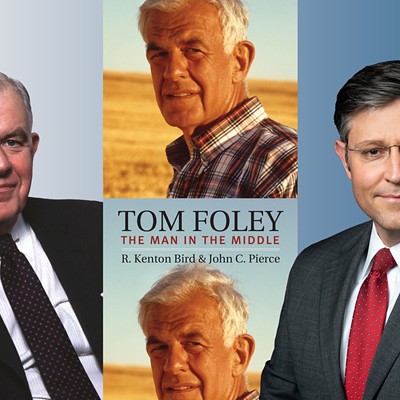
There are limits to the persuasive power of a good idea. There are limits to how many people you can find leaping at the chance to stand outside a megastore for eight hours, clutching an 11-by- 17 piece of paper in the pouring rain, pleading with passers-by for their autograph — purely for the pleasure of supporting a good cause.
Give them $1 or more per signature, however, and… things change. Of course, it’s illegal to give cash to a voter for a signature. But it’s not illegal to give cash to the guy who asks for that signature.
That premise funds an entire industry. Pay a national or statewide petition management firm — such as Arno Political Consultants, Citizen Solutions, or Progressive Campaigns Inc. — and they’ll send out an army with pens, clipboards and a sign-here spiel.
Of the approximately 300,000 signatures needed to pass the income-tax-for-the-rich initiative, I-1077 spokesman Sandeep Kaushik says only about one-third will be collected by volunteers. The rest will be harvested by paid signature-gathering professionals.
Michael Arno of Arno Political Consultants has run nearly 600 petition campaigns in 30 years across 20 different states, including Washington. His firm once gathered 700,000 signatures in California in only 17 days. It gathered 200,000 signatures in 50 days in Washington — despite rain, snow and sleet for 49 of those days.
He says his firm, through contractors, will sometimes send out 300 different agents statewide to collect signatures.
“They’re pretty close to essential,” says Philip Dawdy of the legalize-marijuana Initiative 1068. He’ll have no paid signature-gatherers this year. With less than $8,000 in current campaign contributions, he can’t afford the prices.
And that, he laments, is why, despite strong polling numbers, Initiative 1068’s effort to make the ballot may fail.
THE ARMY
It’s a sunny Sunday morning outside the Fred Meyer at Thor and Third in Spokane. Three signature-gatherers work the crowds of shoppers as they exit and enter the grocery store from different exits. They smile, shake hands, politely ask patrons, “Have you seen the new petitions?” They sing the praises of Initiative 1107 (lower taxes!) and Initiative 1105 (get the government out of the liquor business!) and initiatives in general (take democracy into your own hands!).
They pay no mind to the large white sign behind them: “Petitioners are on Fred Meyer property without our permission… We apologize to you for any inconvenience this petition activity may cause.” (In 1993, Fred Meyer was involved in a lawsuit after they had several petitioners arrested for gathering signatures on their property.)
One petitioner gives his name as Abba Bu Bundie III (though he later tells our photographer his name is Terry). The other two petitioners — working as a team — give their names as Sarah Snipes and Keith Sanders (though Sanders calls Snipes “Laverne” when she gets a phone call).
All three are independent agents. They’ve all driven up from California, a state busy with petitions and referendums. Sharon Gilpin, political consultant, says Washington isn’t nearly as hospitable. “There’s hostility toward signature-gatherers up here, I’ve noticed,” Gilpin says.
Bundie lists tips on how to get a large swath of signatures. Be professional. Lightly tease people when they’re in a hurry. Be polite. Say “Excuse me, sir? Excuse me, miss?” Make people feel happy to have stopped by the store you’re camping in front of.
“Today, I am unofficial greeter for Fred Meyer,” Bundie says. Sanders is a veteran petitioner of two “initiative seasons.” Back in California, he was one of those who gathered signatures to get Proposition 8 — the controversial amendment banning gay marriage in California — on the ballot, even as “very aggressive” demonstrators passed out literature beside him.
Sanders says that just because he asks you to sign an initiative doesn’t mean he agrees with it. Far from it. They’re hired guns. They’re independent contractors paid by subcontractors paid by petition firms paid by initiative committees. If they know many details about whom they work for, they don’t divulge them. They get blank petition sheets, fill them up with names, turn them in and get paid. That’s the important part.
Bundie says he can pull in anywhere from 200 to 300 signatures a day. At 75 cents a name — his current rate — that adds up.
“The paid gatherers — the really, really good ones that sit out at Walmart at eight hours a day — pull 400 and 500 [signatures] a day on your issue,” Dawdy says. “People make a heck of a lot of money doing this. You’re out there and you’re netting a $1.50 a signature. That’s $600 a day.”
When we talked, Gilpin says the petition management firm collecting for I-1100 was being paid $3 per signature — a percent of which goes to the petitioner on the ground. But this week, the price gets higher. Initiative leaders get desperate. The price goes up.
“These next three weeks are World War III on the streets,” Gilpin says. Deadlines are looming. Demand is spiking. On the liquor issue alone, you’ve got two different competing initiatives — one supported by the big stores and the other supported by the beverage industry. These weeks, bounty for a signature on 1-1100 and many other initiatives, she’s hearing, will spike up to $6 or $7.
THE NECESSITY OF MERCENARIES
“A lot of this is forced by the mechanics of our system,” Dawdy says. The earliest an initiative could be filed this year was Jan. 2, and all the signatures are due July 2. And at least on the west side of the state, weather between those dates is often soggy.
“People do not want to stop and talk to signature-gatherers when it’s raining,” Dawdy says. So prime signature-hunting season, really, only lasts a month. Not much time for a ragtag band of part-time volunteers to gather 300,000 names.
Other states aren’t as strict. “Florida allows four years to get all the signatures,” Arno says.
“I think the easiest way to deal with this is to get the signature total down to a more rational level,” Dawdy says. “Some people think the process has become corrupt because it requires too much money.”
And when the price of a signature gets so high, Kaushik says, he starts to worry. “We are concerned about the potential for fraud to develop,” he says.
But the all-volunteer alternative is exhausting. Angela Johnson, Eastern Washington Field Coordinator for Initiative 1068, is camped out near the husk of CompUSA, planning to spend five straight days and nights — one hour of sleep each night — waving down passing cars to get signatures. She’s not impressed by paid petitioners.
“They’re not passionate,” she says. “They’re not informed. They’re salesmen.”
But her campaign director sure could use some of them right about now.
“I mean, look, anybody doing an initiative is a mercenary,” Dawdy says. “They just want their initiative on the ballot. They don’t care how it gets there.”
























